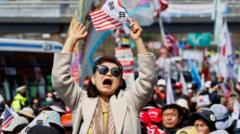The Constitutional Court of South Korea has officially concluded the presidency of Yoon Suk Yeol, marking a significant turning point in the nation's political turmoil. After months marked by divisive protests and political chaos, the court's unanimous decision to uphold Yoon's impeachment, triggered by his controversial declaration of martial law in December, opens the path for new elections and potential reconciliation in a deeply polarized society.
South Korea's Political Landscape Shifts After Yoon Suk Yeol's Impeachment

South Korea's Political Landscape Shifts After Yoon Suk Yeol's Impeachment
Yoon Suk Yeol's presidency ends as South Korea moves towards healing its political division amid a backdrop of external challenges.
As the court's ruling reverberated through Seoul, supporters of Yoon expressed their discontent, highlighting the stark divide within the country. Despite this immediate discord, analysts believe that the removal symbolizes a victory for democracy in South Korea, reminiscent of past struggles against authoritarianism.
For now, the nation faces a leadership void as it deals with pressing external threats, including shifting alliances in the region and international trade issues stemming from recent U.S. tariffs. Yoon must vacate the presidential residence soon, with plans underway to hold a national election within 60 days. The shift in leadership comes at a critical time as South Korea looks to regain a sense of direction and unity ahead of future challenges.
Notable political observers emphasize that the ruling reinforces the supremacy of law in South Korea and could be a vital step toward mending the rift in its political fabric. "This ruling is a testament to the strength of democracy and the rule of law," remarked Sung Deuk Hahm, a political scholar, calling for a collective effort to heal national divisions moving forward.
For now, the nation faces a leadership void as it deals with pressing external threats, including shifting alliances in the region and international trade issues stemming from recent U.S. tariffs. Yoon must vacate the presidential residence soon, with plans underway to hold a national election within 60 days. The shift in leadership comes at a critical time as South Korea looks to regain a sense of direction and unity ahead of future challenges.
Notable political observers emphasize that the ruling reinforces the supremacy of law in South Korea and could be a vital step toward mending the rift in its political fabric. "This ruling is a testament to the strength of democracy and the rule of law," remarked Sung Deuk Hahm, a political scholar, calling for a collective effort to heal national divisions moving forward.


















